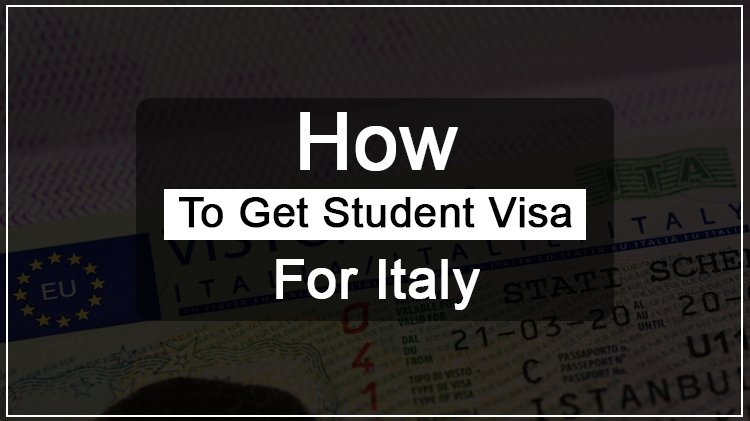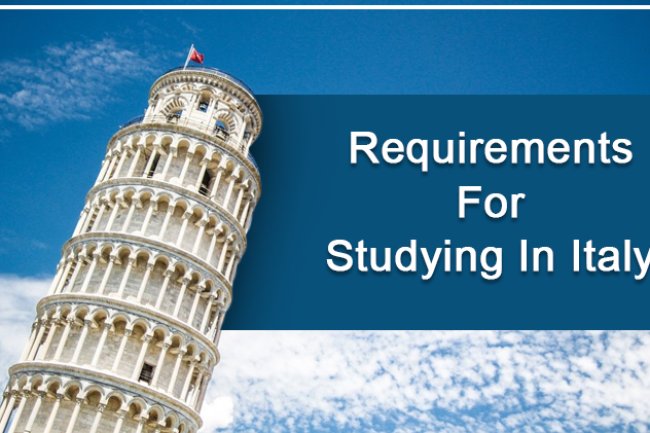How To Get Student Visa For Italy
If you are an international student who is interested in studying in Italy, you may be wondering how to get a student visa for Italy. there are a few things you'll need to do in order to get Italy student visa.

Are you interested in applying to an Italian university and considering studying abroad? Congratulations, then!
Italian institutions are among the most prestigious in the world, and in addition to receiving top-notch education, you will also have the opportunity to enjoy the cuisine, gorgeous architecture, and countless other breathtaking sights that are unique to the nation.
Good news if you are an EU/EEA national who has decided to study abroad in Italy! Italy won't need you to have a student visa. All other non-EU/EEA students should take the following actions as they prepare to submit their student visa applications:
1. Apply to an Italian university and get the acceptance letter
If you are still unsure of where you want to study in Italy, you must decide before you can start the application procedure for a student visa. After being accepted into an Italian university, you will receive a letter of acceptance, which is required for the visa application.
Check out a couple of Italy's best colleges and universities:
- Politecnico di Milano
- University of Padova
- Politecnico di Torino
- Free University of Bozen-Bolzano
- University of Siena
- Università Cattolica del Sacro Cuore
- SDA Bocconi School of Management
2. Find out what type of visa you need to study in Italy
The opportunity for other international students to study in Italy without a visa is not as lucky as it is for EU/EEA students. Even so, having all the necessary information on hand makes submitting a visa application easier.
Depending on how long you plan to stay in Italy and what you plan to study, you must submit an application for one of the following types of visas:
You require a short-stay visa if you wish to enroll in a course that is less than 90 days long, such as a language programme (type C).
You must apply for a long-stay visa if you wish to enroll in a degree programme that lasts longer than 90 days and requires at least 20 hours of coursework per week (or 80 hours per month) (type D). The simplest way to find out if you need a visa is to respond to a few simple questions on the official Visa for Italy website.
For instance, if they want to stay in Italy for less than 90 days, citizens of some non-EU/EEA countries do not need a visa. Here are a few examples:
The subsequent nations: United States of America, Australia, New Zealand, Hong Kong (SAR), Ukraine
3. Conditions you have to meet to apply for a visa in Italy
- You need a passport that is currently valid and has at least two blank visa pages.
- A copy of your flight itinerary is required.
- You cannot have a criminal history.
- You must not have previously had your immigration to Italy denied.
4. When and where to apply for the student visa in Italy
- At the Italian embassy or consulate in your nation, submit a visa application.
- Plan a visa interview for four to six weeks in advance.
- Submit an application for a student visa at least three months before travelling to Italy. Your application's processing period could take one to three weeks, occasionally even longer.
5. Tips about the student visa application in Italy
If you failed to schedule an appointment at least four weeks beforehand, check with the embassy for cancellations and then attempt to alter the appointment date.
You may schedule an appointment at the Honorary Consulate if it is closer to your home and you are unable to make it to the consulate for the visa interview. However, you should first inquire with the embassy in your neighborhood to see if this option is accessible.
6. Language requirements for studying in Italy
It is not necessary to speak any specific languages in order to apply for a student visa in Italy. The necessity for extra language proof from candidates is not considered by consulates because this is one of the requirements for enrollment at an Italian university.
However, visa officers will be more impressed and appreciative if you speak Italian, at least at a conversational level. You could, for instance, greet someone and identify yourself in Italian.
To earn an English-taught degree from an Italian university, you must pass one of the following English language tests:
- IELTS Academic, PTE Academic, and TOEFL iBT
- Verify which test(s) the university accepts before deciding on a test date.
7. Documents for a student visa in Italy
- Application for an entry visa.
- A current passport-size photo(s).
- A genuine travel document (the expiry date should be three months longer than that of the visa requested).
- Evidence that you have made travel arrangements to Italy (for the whole period of your studies).
- Demonstrate that you have the necessary resources to support your studies (at least 900 EUR per month).
- Paid 150 EUR for health insurance throughout the first year of education.
- A copy of a previous education's diploma.
- Letter of Acceptance from an Italian University.
- Payment for the visa application fee received (50 EUR).
8. Apply for a work permit in Italy
If you are an EU citizen, you are not required to have a work permit to work in Italy. However, you shouldn't work more than 20 hours each week during the semester. Only if you desire to, you may work full-time during the semester breaks.
Read Also: Requirements For Studying In Italy
Students from outside the EU are required to apply for a work permit at a nearby Italian immigration office. However, you must first present the immigration office with a signed job contract and a copy of it.
Working a part-time job wouldn't allow you to earn enough money to pay your tuition. However, finding a job as a student is not that difficult, especially if you speak a little Italian. Even better, you can hunt for job openings within your university and work the entire academic year as an administrative assistant or library assistant.
Regional job portals, newspapers, and the international office help desk are the best places to find job listings.
9. Conditions to apply for a residence permit
Non-EU citizens
Anyone arriving from outside the EU should apply for a residency permit (permesso di soggiorno) at any post office within eight days of arrival.
The main paperwork that needs to be provided is as follows: a copy of your passport, proof of health insurance, and a student visa for Italian citizens.
A copy of the declaration attesting to the courses you'll be doing in Italy, along with four recent passport-size photos.
EU citizens
Simply fill out a declaration of presence application (dichiarazione di presenza) and submit it within eight days of your arrival at the police station (Questura).
Now that you are aware of how to obtain a student visa for Italy, you can apply for your selected bachelor's or master's degree. As soon as you have received acceptance from an Italian university and have completed the home-based visa application process, you can begin packing your bags and making travel arrangements.
What's Your Reaction?





















